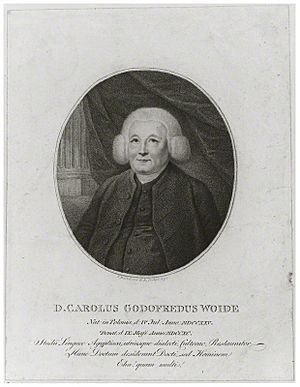Carl Gottfried Woide facts for kids
Quick facts for kids
Carl Gottfried Woide
|
|
|---|---|
 |
|
| Born | July 4, 1725 |
| Died | May 9, 1790 British Museum, London
|
| Other names | Charles Godfrey Woide |
| Occupation | pastor and scholar |
Carl Gottfried Woide (also known as Charles Godfrey Woide) was a smart scholar and a pastor. He was born in Germany on July 4, 1725, and passed away on May 9, 1790. He was very interested in ancient languages, especially those from the Middle East. He also studied old religious texts.
Contents
Woide's Journey and Work
Woide started his career as a pastor, which is a religious leader, in a church in Leszno, Poland. He was very dedicated to learning.
Becoming a Language Expert
In 1750, Woide copied an important old book called Lexicon Ægyptiaco-Latinum. This book was like a dictionary for an ancient Egyptian language. He learned a special language called Coptic, especially a part of it called Sahidic. He became a real expert in this old language.
Life in Britain and the British Museum
In 1768, Woide moved to Britain and lived there until he died. He continued to work as a pastor in London. Later, he got a job as a librarian at the famous British Museum. He first worked with natural history books, then with printed books. His main job was to look after old manuscripts from the Middle East.
He was one of the first people to study ancient Egyptian texts written in the Sahidic language. He carefully looked at a very old and important book called the Codex Alexandrinus. This book contains parts of the New Testament, which is a section of the Christian Bible. In 1786, Woide helped publish the New Testament text from this ancient book.
A Sociable Scholar
Someone named C. P. Moritz described Woide in 1782. He said Woide lived in a nice, fresh part of London. Even though Woide was known for his deep knowledge of old languages, he was also a friendly and social person.
The Fragmentum Woideanum
Woide owned some old pages from a special book. These pages were written in both Greek and Coptic. They contained parts of the Book of Luke from the New Testament. This collection of pages is now known as the Fragmentum Woideanum, named after him. Woide thought these pages were made around the 7th century. Other pages from this same old book are kept in different places around the world.
His Life and Lasting Impact
Woide studied at universities in Germany and the Netherlands. He earned a special degree in divinity from a university in Denmark.
Honors and Family
Because of his amazing work, Woide was chosen to be a member of the Royal Society in 1785. This is a very important group for scientists and scholars. He also received an honorary degree from the University of Oxford in 1786. He was a member of many other important groups in different countries.
Woide and his wife had two daughters. In 1790, he suddenly became very ill while talking with a friend and later passed away in his rooms at the British Museum.
His Legacy
Woide's important papers and writings are now kept at the British Library. The Fragmentum Woideanum, those old pages he owned, are kept at the Clarendon Press in Oxford. His work helped us understand ancient languages and old religious texts much better.
Woide's Published Works
Woide wrote and published several important books during his life:
- Lexicon Ægyptiaco-Latinum, published in 1775. This was a dictionary for the ancient Egyptian language.
- Grammatica aegyptiaca utriusque dialecti, published in 1778. This was a grammar book for the Egyptian language.
- Novum Testamentum Graecum e codice ms. alexandrino, published in London in 1786. This was the Greek New Testament from the ancient Codex Alexandrinus.
- Appendix ad editionem Novi Testamenti graeci…, published in Oxford in 1799. This book included fragments of the New Testament in the Sahidic Egyptian language.
 | Selma Burke |
 | Pauline Powell Burns |
 | Frederick J. Brown |
 | Robert Blackburn |

